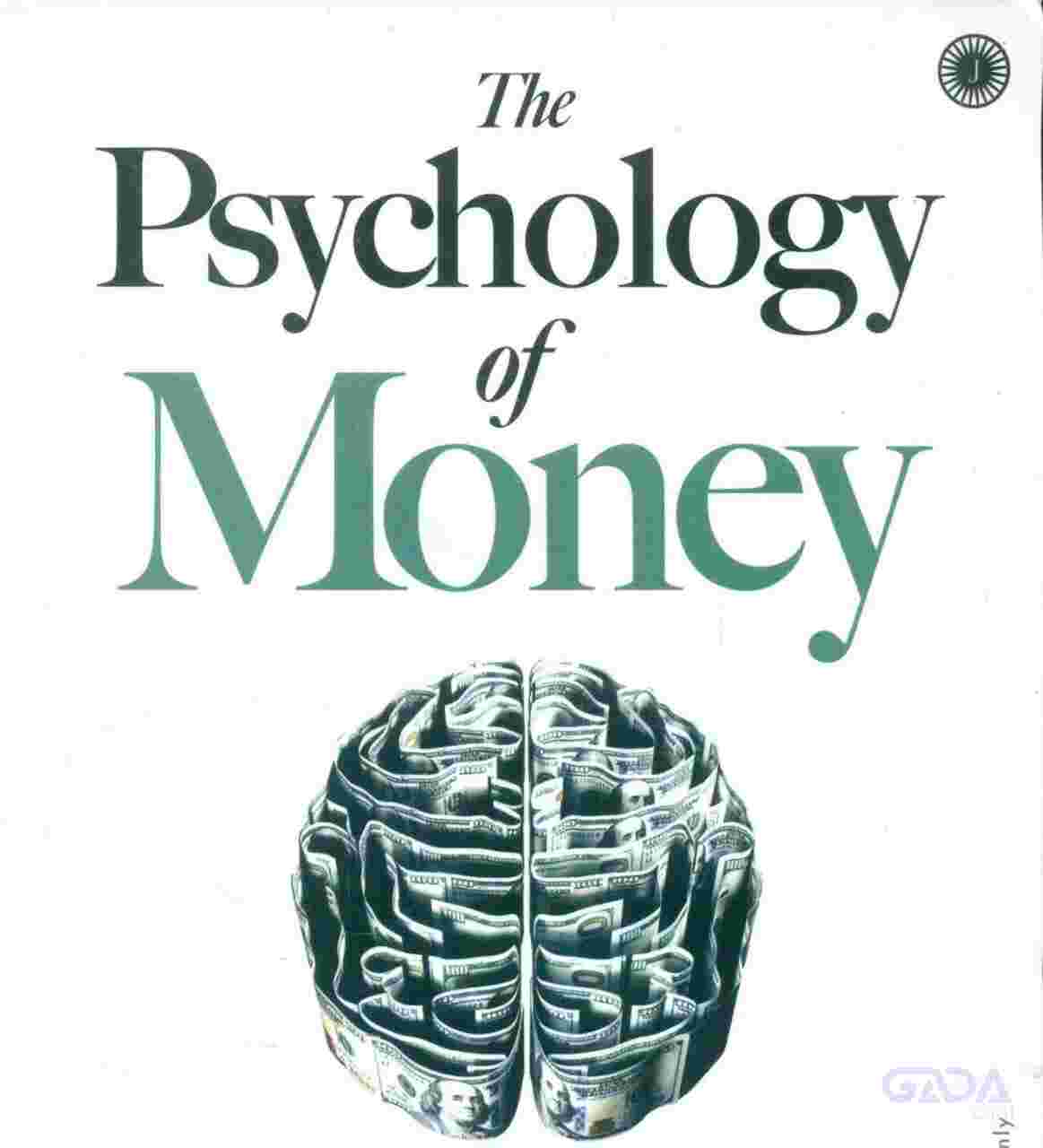🙋🏻♀️ *Top 10 Takeaways from the Must-Read Book:*
"𝐓𝐇𝐄 𝐏𝐒𝐘𝐂𝐇𝐎𝐋𝐎𝐆𝐘 𝐎𝐅 𝐌𝐎𝐍𝐄𝐘"
𝐁𝐲 𝐌𝐨𝐫𝐠𝐚𝐧 𝐇𝐨𝐮𝐬𝐞𝐥
𝟏𝟎 𝐊𝐄𝐘 𝐓𝐀𝐊𝐄𝐀𝐖𝐀𝐘𝐒:
1️⃣ 0𝟏. 𝐖𝐞𝐚𝐥𝐭𝐡 𝐈𝐬 𝐍𝐨𝐭 𝐚 𝐍𝐮𝐦𝐛𝐞𝐫 - 𝐈𝐭'𝐬 𝐚 𝐅𝐞𝐞𝐥𝐢𝐧𝐠 𝐨𝐟 𝐅𝐫𝐞𝐞𝐝𝐨𝐦 𝐚𝐧𝐝 𝐂𝐨𝐧𝐭𝐫𝐨𝐥!
𝐄𝐱𝐩𝐥𝐚𝐧𝐚𝐭𝐢𝐨𝐧: Wealth isn’t just about the numbers; it's about freedom, peace of mind 🧘🏻♀️, and the ability to control your time . True wealth is often invisible - it’s the income not spent, the luxury not flaunted 💃🏻.
𝐄𝐱𝐚𝐦𝐩𝐥𝐞: A middle-class individual 🧔🏻♂ who saves consistently and avoids lifestyle inflation can enjoy more flexibility than a high-earning executive living paycheck-to-paycheck .
2️⃣ 0𝟐. 𝐓𝐢𝐦𝐞 𝐈𝐬 𝐭𝐡𝐞 𝐌𝐨𝐬𝐭 𝐏𝐨𝐰𝐞𝐫𝐟𝐮𝐥 𝐅𝐨𝐫𝐜𝐞 𝐢𝐧 𝐅𝐢𝐧𝐚𝐧𝐜𝐞!
𝐄𝐱𝐩𝐥𝐚𝐧𝐚𝐭𝐢𝐨𝐧: Compounding 😵💫 works best over decades. Financial success requires patience and consistency, not just high returns.
𝐄𝐱𝐚𝐦𝐩𝐥𝐞: Warren Buffett started investing at 10 and kept at it for over 80 years - this time horizon made him one of the richest people in the world .
3️⃣ 0𝟑. 𝐑𝐢𝐬𝐤 🧗🏻♀️ 𝐈𝐬 𝐄𝐯𝐞𝐫𝐲𝐰𝐡𝐞𝐫𝐞 - 𝐔𝐧𝐝𝐞𝐫𝐬𝐭𝐚𝐧𝐝 𝐚𝐧𝐝 𝐑𝐞𝐬𝐩𝐞𝐜𝐭 𝐈𝐭!
𝐄𝐱𝐩𝐥𝐚𝐧𝐚𝐭𝐢𝐨𝐧: Every financial decision involves risk . What matters is managing that risk thoughtfully , not avoiding it entirely. Emotions like fear can cloud judgment.
𝐄𝐱𝐚𝐦𝐩𝐥𝐞: A cautious business that preserved cash during COVID was more likely to survive than one that over-leveraged expecting constant growth .
4️⃣ 0𝟒. 𝐆𝐫𝐞𝐞𝐝 𝐚𝐧𝐝 𝐅𝐞𝐚𝐫 𝐀𝐫𝐞 𝐭𝐡𝐞 𝐓𝐰𝐢𝐧 𝐕𝐢𝐥𝐥𝐚𝐢𝐧𝐬 𝐨𝐟 𝐖𝐞𝐚𝐥𝐭𝐡!
𝐄𝐱𝐩𝐥𝐚𝐧𝐚𝐭𝐢𝐨𝐧: Greed makes us chase returns without understanding consequences; fear keeps us from taking reasonable risks. Balancing the two is crucial for long-term wealth.
𝐄𝐱𝐚𝐦𝐩𝐥𝐞: Many investors bought overvalued stocks out of greed and panic-sold during downturns out of fear - both extremes cost them wealth.
5️⃣ 0𝟓. 𝐇𝐚𝐩𝐩𝐢𝐧𝐞𝐬𝐬 𝐈𝐬 𝐍𝐨𝐭 𝐭𝐡𝐞 𝐒𝐚𝐦𝐞 𝐚𝐬 𝐅𝐢𝐧𝐚𝐧𝐜𝐢𝐚𝐥 𝐒𝐮𝐜𝐜𝐞𝐬𝐬!
𝐄𝐱𝐩𝐥𝐚𝐧𝐚𝐭𝐢𝐨𝐧: Money can make life easier, but it doesn’t make it fulfilling. Relationships , autonomy, and purpose are stronger predictors of happiness.
𝐄𝐱𝐚𝐦𝐩𝐥𝐞: Studies show people are happiest when they have meaningful relationships - not necessarily when they reach income milestones.
6️⃣ 0𝟔. 𝐘𝐨𝐮𝐫 𝐅𝐮𝐭𝐮𝐫𝐞 𝐒𝐞𝐥𝐟 𝐈𝐬 𝐚 𝐒𝐭𝐫𝐚𝐧𝐠𝐞𝐫 - 𝐏𝐥𝐚𝐧 𝐰𝐢𝐭𝐡 𝐅𝐥𝐞𝐱𝐢𝐛𝐢𝐥𝐢𝐭𝐲!
𝐄𝐱𝐩𝐥𝐚𝐧𝐚𝐭𝐢𝐨𝐧: What you value today may not be what you value in 10 or 20 years. Plan with room for evolution.
𝐄𝐱𝐚𝐦𝐩𝐥𝐞: Someone saving aggressively for early retirement might later choose to work longer in a purpose-driven role. Your plan must be adjustable.
7️⃣ 0𝟕. 𝐋𝐮𝐜𝐤 𝐚𝐧𝐝 𝐑𝐢𝐬𝐤 𝐒𝐡𝐚𝐩𝐞 𝐄𝐯𝐞𝐫𝐲 𝐎𝐮𝐭𝐜𝐨𝐦𝐞 - 𝐌𝐨𝐫𝐞 𝐓𝐡𝐚𝐧 𝐖𝐞 𝐑𝐞𝐚𝐥𝐢𝐬𝐞!
𝐄𝐱𝐩𝐥𝐚𝐧𝐚𝐭𝐢𝐨𝐧: Success isn’t always about effort or intelligence . It’s often about timing, environment, or chance encounters. Similarly, failures can result from bad luck despite smart planning .
𝐄𝐱𝐚𝐦𝐩𝐥𝐞: Bill Gates had early access to a computer at school - an extremely rare opportunity in the 1960s. His peer , equally capable, never got that chance.
8️⃣ 0𝟖. 𝐒𝐚𝐯𝐞 𝐅𝐢𝐫𝐬𝐭, 𝐒𝐩𝐞𝐧𝐝 𝐖𝐡𝐚𝐭’𝐬 𝐋𝐞𝐟𝐭 - 𝐍𝐨𝐭 𝐭𝐡𝐞 𝐎𝐭𝐡𝐞𝐫 𝐖𝐚𝐲 𝐀𝐫𝐨𝐮𝐧𝐝!
𝐄𝐱𝐩𝐥𝐚𝐧𝐚𝐭𝐢𝐨𝐧: Saving should not be a leftover. It must be a deliberate act that comes before expenses. This builds resilience.
𝐄𝐱𝐚𝐦𝐩𝐥𝐞: An individual who sets aside savings as an automated deduction builds financial security without relying on willpower each month .
9️⃣ 0𝟗. 𝐋𝐢𝐯𝐢𝐧𝐠 𝐁𝐞𝐥𝐨𝐰 𝐘𝐨𝐮𝐫 𝐌𝐞𝐚𝐧𝐬 𝐈𝐬 𝐚 𝐒𝐮𝐩𝐞𝐫𝐩𝐨𝐰𝐞𝐫 💪🏻!
𝐄𝐱𝐩𝐥𝐚𝐧𝐚𝐭𝐢𝐨𝐧: The discipline 🤹🏻♀️ to spend less than you earn unlocks flexibility, reduces stress , and allows wealth to accumulate quietly in the background.
𝐄𝐱𝐚𝐦𝐩𝐥𝐞: Those with simple lifestyles and strong savings can make life decisions—like career changes—without fear of financial instability.
𝟏𝟎. 𝐒𝐭𝐚𝐲 𝐂𝐮𝐫𝐢𝐨𝐮𝐬 - 𝐓𝐡𝐞 𝐁𝐞𝐬𝐭 𝐈𝐧𝐯𝐞𝐬𝐭𝐨𝐫𝐬 𝐀𝐫𝐞 𝐋𝐢𝐟𝐞𝐥𝐨𝐧𝐠 𝐋𝐞𝐚𝐫𝐧𝐞𝐫𝐬!
𝐄𝐱𝐩𝐥𝐚𝐧𝐚𝐭𝐢𝐨𝐧: The financial world is constantly changing. Staying curious, reading broadly, and avoiding overconfidence are key to staying relevant and successful.
𝐄𝐱𝐚𝐦𝐩𝐥𝐞: Investors who adapted to digital trends or environmental shifts in the market had a major advantage over those who clung to outdated strategies.
𝐂𝐎𝐑𝐄 𝐂𝐎𝐍𝐂𝐄𝐏𝐓𝐒 𝐀𝐍𝐃 𝐅𝐑𝐀𝐌𝐄𝐖𝐎𝐑𝐊𝐒 𝐄𝐗𝐏𝐋𝐀𝐈𝐍𝐄𝐃:
0𝟏. 𝐄𝐧𝐨𝐮𝐠𝐡:
Understanding what “enough” means is essential to avoid overreaching and risking what you already have for what you don’t need. Housel borrows from philosophy and Stoicism to introduce the idea that happiness and security come from knowing when to stop chasing more.
*“Enough is not too little. Enough is realizing that the opposite - an insatiable appetite for more - will push you to the point of regret.”*
0𝟐. 𝐂𝐨𝐧𝐟𝐨𝐮𝐧𝐝𝐢𝐧𝐠 𝐂𝐨𝐦𝐩𝐨𝐮𝐧𝐝𝐢𝐧𝐠:
Compounding isn't intuitive for most people, which is why they underestimate its power 💪🏻. The real magic of wealth happens over time, not overnight.
Warren Buffett's net worth was ~$81 billion when he was 65 - having started at 10. That’s the compounding curve in action.
0𝟑. 𝐒𝐚𝐯𝐞 𝐋𝐢𝐤𝐞 𝐚 𝐏𝐞𝐬𝐬𝐢𝐦𝐢𝐬𝐭, 𝐈𝐧𝐯𝐞𝐬𝐭 𝐋𝐢𝐤𝐞 𝐚𝐧 𝐎𝐩𝐭𝐢𝐦𝐢𝐬𝐭:
Save defensively for unexpected setbacks, but invest believing in long-term progress .
Build a margin of safety but also trust that innovation, growth , and recovery are part of the human story.
0𝟒. 𝐓𝐚𝐢𝐥𝐬 𝐃𝐫𝐢𝐯𝐞 𝐄𝐯𝐞𝐫𝐲𝐭𝐡𝐢𝐧𝐠:
Extreme events (positive or negative) have disproportionate impact. In investing, a handful of good decisions or lucky breaks can define a lifetime outcome.
Bezos built Amazon, but it’s AWS and Prime that became the ‘tail events’ driving its true growth.
0𝟓. 𝐌𝐚𝐧 𝐢𝐧 𝐭𝐡𝐞 𝐂𝐚𝐫 𝐏𝐚𝐫𝐚𝐝𝐨𝐱:
Wealth flaunted rarely wins respect. *People admire the car, not the driver.* Real status comes from humility and freedom, not luxury branding.
0𝟔. 𝐘𝐨𝐮’𝐫𝐞 𝐍𝐨𝐭 𝐀𝐥𝐨𝐧𝐞:
Everyone has different goals , timelines, and risk tolerance. What works for others might not work for you 🫵🏻. Avoid copying strategies blindly.
0𝟕. 𝐑𝐨𝐨𝐦 𝐟𝐨𝐫 𝐄𝐫𝐫𝐨𝐫:
A little 🤏🏻 margin of safety in decisions—be it financial, emotional, or career-related - can make the difference between survival and collapse.
"𝑻𝒉𝒆 𝑷𝒔𝒚𝒄𝒉𝒐𝒍𝒐𝒈𝒚 𝒐𝒇 𝑴𝒐𝒏𝒆𝒚 𝒊𝒔 𝒏𝒐𝒕 𝒋𝒖𝒔𝒕 𝒂 𝒃𝒐𝒐𝒌 𝒂𝒃𝒐𝒖𝒕 𝒎𝒐𝒏𝒆𝒚 - 𝒊𝒕’𝒔 𝒂 𝒎𝒊𝒓𝒓𝒐𝒓 𝒕𝒉𝒂𝒕 𝒔𝒉𝒐𝒘𝒔 𝒉𝒐𝒘 𝒚𝒐𝒖𝒓 𝒃𝒆𝒍𝒊𝒆𝒇𝒔, 𝒉𝒂𝒃𝒊𝒕𝒔, 𝒂𝒏𝒅 𝒊𝒏𝒔𝒆𝒄𝒖𝒓𝒊𝒕𝒊𝒆𝒔 𝒔𝒉𝒂𝒑𝒆 𝒚𝒐𝒖𝒓 𝒘𝒆𝒂𝒍𝒕𝒉 𝒇𝒂𝒓 𝒎𝒐𝒓𝒆 𝒕𝒉𝒂𝒏 𝒏𝒖𝒎𝒃𝒆𝒓𝒔 𝒆𝒗𝒆𝒓 𝒄𝒐𝒖𝒍𝒅.”
Thank 🙏🏻 for reading so far, please share with your loved ones!
💁🏻♀️ *For more such content, follow us on:*
https://whatsapp.com/channel/0029Va4cUYi7tkjAQFo0RW00
"𝐓𝐇𝐄 𝐏𝐒𝐘𝐂𝐇𝐎𝐋𝐎𝐆𝐘 𝐎𝐅 𝐌𝐎𝐍𝐄𝐘"
𝐁𝐲 𝐌𝐨𝐫𝐠𝐚𝐧 𝐇𝐨𝐮𝐬𝐞𝐥
𝟏𝟎 𝐊𝐄𝐘 𝐓𝐀𝐊𝐄𝐀𝐖𝐀𝐘𝐒:
1️⃣ 0𝟏. 𝐖𝐞𝐚𝐥𝐭𝐡 𝐈𝐬 𝐍𝐨𝐭 𝐚 𝐍𝐮𝐦𝐛𝐞𝐫 - 𝐈𝐭'𝐬 𝐚 𝐅𝐞𝐞𝐥𝐢𝐧𝐠 𝐨𝐟 𝐅𝐫𝐞𝐞𝐝𝐨𝐦 𝐚𝐧𝐝 𝐂𝐨𝐧𝐭𝐫𝐨𝐥!
𝐄𝐱𝐩𝐥𝐚𝐧𝐚𝐭𝐢𝐨𝐧: Wealth isn’t just about the numbers; it's about freedom, peace of mind 🧘🏻♀️, and the ability to control your time . True wealth is often invisible - it’s the income not spent, the luxury not flaunted 💃🏻.
𝐄𝐱𝐚𝐦𝐩𝐥𝐞: A middle-class individual 🧔🏻♂ who saves consistently and avoids lifestyle inflation can enjoy more flexibility than a high-earning executive living paycheck-to-paycheck .
2️⃣ 0𝟐. 𝐓𝐢𝐦𝐞 𝐈𝐬 𝐭𝐡𝐞 𝐌𝐨𝐬𝐭 𝐏𝐨𝐰𝐞𝐫𝐟𝐮𝐥 𝐅𝐨𝐫𝐜𝐞 𝐢𝐧 𝐅𝐢𝐧𝐚𝐧𝐜𝐞!
𝐄𝐱𝐩𝐥𝐚𝐧𝐚𝐭𝐢𝐨𝐧: Compounding 😵💫 works best over decades. Financial success requires patience and consistency, not just high returns.
𝐄𝐱𝐚𝐦𝐩𝐥𝐞: Warren Buffett started investing at 10 and kept at it for over 80 years - this time horizon made him one of the richest people in the world .
3️⃣ 0𝟑. 𝐑𝐢𝐬𝐤 🧗🏻♀️ 𝐈𝐬 𝐄𝐯𝐞𝐫𝐲𝐰𝐡𝐞𝐫𝐞 - 𝐔𝐧𝐝𝐞𝐫𝐬𝐭𝐚𝐧𝐝 𝐚𝐧𝐝 𝐑𝐞𝐬𝐩𝐞𝐜𝐭 𝐈𝐭!
𝐄𝐱𝐩𝐥𝐚𝐧𝐚𝐭𝐢𝐨𝐧: Every financial decision involves risk . What matters is managing that risk thoughtfully , not avoiding it entirely. Emotions like fear can cloud judgment.
𝐄𝐱𝐚𝐦𝐩𝐥𝐞: A cautious business that preserved cash during COVID was more likely to survive than one that over-leveraged expecting constant growth .
4️⃣ 0𝟒. 𝐆𝐫𝐞𝐞𝐝 𝐚𝐧𝐝 𝐅𝐞𝐚𝐫 𝐀𝐫𝐞 𝐭𝐡𝐞 𝐓𝐰𝐢𝐧 𝐕𝐢𝐥𝐥𝐚𝐢𝐧𝐬 𝐨𝐟 𝐖𝐞𝐚𝐥𝐭𝐡!
𝐄𝐱𝐩𝐥𝐚𝐧𝐚𝐭𝐢𝐨𝐧: Greed makes us chase returns without understanding consequences; fear keeps us from taking reasonable risks. Balancing the two is crucial for long-term wealth.
𝐄𝐱𝐚𝐦𝐩𝐥𝐞: Many investors bought overvalued stocks out of greed and panic-sold during downturns out of fear - both extremes cost them wealth.
5️⃣ 0𝟓. 𝐇𝐚𝐩𝐩𝐢𝐧𝐞𝐬𝐬 𝐈𝐬 𝐍𝐨𝐭 𝐭𝐡𝐞 𝐒𝐚𝐦𝐞 𝐚𝐬 𝐅𝐢𝐧𝐚𝐧𝐜𝐢𝐚𝐥 𝐒𝐮𝐜𝐜𝐞𝐬𝐬!
𝐄𝐱𝐩𝐥𝐚𝐧𝐚𝐭𝐢𝐨𝐧: Money can make life easier, but it doesn’t make it fulfilling. Relationships , autonomy, and purpose are stronger predictors of happiness.
𝐄𝐱𝐚𝐦𝐩𝐥𝐞: Studies show people are happiest when they have meaningful relationships - not necessarily when they reach income milestones.
6️⃣ 0𝟔. 𝐘𝐨𝐮𝐫 𝐅𝐮𝐭𝐮𝐫𝐞 𝐒𝐞𝐥𝐟 𝐈𝐬 𝐚 𝐒𝐭𝐫𝐚𝐧𝐠𝐞𝐫 - 𝐏𝐥𝐚𝐧 𝐰𝐢𝐭𝐡 𝐅𝐥𝐞𝐱𝐢𝐛𝐢𝐥𝐢𝐭𝐲!
𝐄𝐱𝐩𝐥𝐚𝐧𝐚𝐭𝐢𝐨𝐧: What you value today may not be what you value in 10 or 20 years. Plan with room for evolution.
𝐄𝐱𝐚𝐦𝐩𝐥𝐞: Someone saving aggressively for early retirement might later choose to work longer in a purpose-driven role. Your plan must be adjustable.
7️⃣ 0𝟕. 𝐋𝐮𝐜𝐤 𝐚𝐧𝐝 𝐑𝐢𝐬𝐤 𝐒𝐡𝐚𝐩𝐞 𝐄𝐯𝐞𝐫𝐲 𝐎𝐮𝐭𝐜𝐨𝐦𝐞 - 𝐌𝐨𝐫𝐞 𝐓𝐡𝐚𝐧 𝐖𝐞 𝐑𝐞𝐚𝐥𝐢𝐬𝐞!
𝐄𝐱𝐩𝐥𝐚𝐧𝐚𝐭𝐢𝐨𝐧: Success isn’t always about effort or intelligence . It’s often about timing, environment, or chance encounters. Similarly, failures can result from bad luck despite smart planning .
𝐄𝐱𝐚𝐦𝐩𝐥𝐞: Bill Gates had early access to a computer at school - an extremely rare opportunity in the 1960s. His peer , equally capable, never got that chance.
8️⃣ 0𝟖. 𝐒𝐚𝐯𝐞 𝐅𝐢𝐫𝐬𝐭, 𝐒𝐩𝐞𝐧𝐝 𝐖𝐡𝐚𝐭’𝐬 𝐋𝐞𝐟𝐭 - 𝐍𝐨𝐭 𝐭𝐡𝐞 𝐎𝐭𝐡𝐞𝐫 𝐖𝐚𝐲 𝐀𝐫𝐨𝐮𝐧𝐝!
𝐄𝐱𝐩𝐥𝐚𝐧𝐚𝐭𝐢𝐨𝐧: Saving should not be a leftover. It must be a deliberate act that comes before expenses. This builds resilience.
𝐄𝐱𝐚𝐦𝐩𝐥𝐞: An individual who sets aside savings as an automated deduction builds financial security without relying on willpower each month .
9️⃣ 0𝟗. 𝐋𝐢𝐯𝐢𝐧𝐠 𝐁𝐞𝐥𝐨𝐰 𝐘𝐨𝐮𝐫 𝐌𝐞𝐚𝐧𝐬 𝐈𝐬 𝐚 𝐒𝐮𝐩𝐞𝐫𝐩𝐨𝐰𝐞𝐫 💪🏻!
𝐄𝐱𝐩𝐥𝐚𝐧𝐚𝐭𝐢𝐨𝐧: The discipline 🤹🏻♀️ to spend less than you earn unlocks flexibility, reduces stress , and allows wealth to accumulate quietly in the background.
𝐄𝐱𝐚𝐦𝐩𝐥𝐞: Those with simple lifestyles and strong savings can make life decisions—like career changes—without fear of financial instability.
𝟏𝟎. 𝐒𝐭𝐚𝐲 𝐂𝐮𝐫𝐢𝐨𝐮𝐬 - 𝐓𝐡𝐞 𝐁𝐞𝐬𝐭 𝐈𝐧𝐯𝐞𝐬𝐭𝐨𝐫𝐬 𝐀𝐫𝐞 𝐋𝐢𝐟𝐞𝐥𝐨𝐧𝐠 𝐋𝐞𝐚𝐫𝐧𝐞𝐫𝐬!
𝐄𝐱𝐩𝐥𝐚𝐧𝐚𝐭𝐢𝐨𝐧: The financial world is constantly changing. Staying curious, reading broadly, and avoiding overconfidence are key to staying relevant and successful.
𝐄𝐱𝐚𝐦𝐩𝐥𝐞: Investors who adapted to digital trends or environmental shifts in the market had a major advantage over those who clung to outdated strategies.
𝐂𝐎𝐑𝐄 𝐂𝐎𝐍𝐂𝐄𝐏𝐓𝐒 𝐀𝐍𝐃 𝐅𝐑𝐀𝐌𝐄𝐖𝐎𝐑𝐊𝐒 𝐄𝐗𝐏𝐋𝐀𝐈𝐍𝐄𝐃:
0𝟏. 𝐄𝐧𝐨𝐮𝐠𝐡:
Understanding what “enough” means is essential to avoid overreaching and risking what you already have for what you don’t need. Housel borrows from philosophy and Stoicism to introduce the idea that happiness and security come from knowing when to stop chasing more.
*“Enough is not too little. Enough is realizing that the opposite - an insatiable appetite for more - will push you to the point of regret.”*
0𝟐. 𝐂𝐨𝐧𝐟𝐨𝐮𝐧𝐝𝐢𝐧𝐠 𝐂𝐨𝐦𝐩𝐨𝐮𝐧𝐝𝐢𝐧𝐠:
Compounding isn't intuitive for most people, which is why they underestimate its power 💪🏻. The real magic of wealth happens over time, not overnight.
Warren Buffett's net worth was ~$81 billion when he was 65 - having started at 10. That’s the compounding curve in action.
0𝟑. 𝐒𝐚𝐯𝐞 𝐋𝐢𝐤𝐞 𝐚 𝐏𝐞𝐬𝐬𝐢𝐦𝐢𝐬𝐭, 𝐈𝐧𝐯𝐞𝐬𝐭 𝐋𝐢𝐤𝐞 𝐚𝐧 𝐎𝐩𝐭𝐢𝐦𝐢𝐬𝐭:
Save defensively for unexpected setbacks, but invest believing in long-term progress .
Build a margin of safety but also trust that innovation, growth , and recovery are part of the human story.
0𝟒. 𝐓𝐚𝐢𝐥𝐬 𝐃𝐫𝐢𝐯𝐞 𝐄𝐯𝐞𝐫𝐲𝐭𝐡𝐢𝐧𝐠:
Extreme events (positive or negative) have disproportionate impact. In investing, a handful of good decisions or lucky breaks can define a lifetime outcome.
Bezos built Amazon, but it’s AWS and Prime that became the ‘tail events’ driving its true growth.
0𝟓. 𝐌𝐚𝐧 𝐢𝐧 𝐭𝐡𝐞 𝐂𝐚𝐫 𝐏𝐚𝐫𝐚𝐝𝐨𝐱:
Wealth flaunted rarely wins respect. *People admire the car, not the driver.* Real status comes from humility and freedom, not luxury branding.
0𝟔. 𝐘𝐨𝐮’𝐫𝐞 𝐍𝐨𝐭 𝐀𝐥𝐨𝐧𝐞:
Everyone has different goals , timelines, and risk tolerance. What works for others might not work for you 🫵🏻. Avoid copying strategies blindly.
0𝟕. 𝐑𝐨𝐨𝐦 𝐟𝐨𝐫 𝐄𝐫𝐫𝐨𝐫:
A little 🤏🏻 margin of safety in decisions—be it financial, emotional, or career-related - can make the difference between survival and collapse.
"𝑻𝒉𝒆 𝑷𝒔𝒚𝒄𝒉𝒐𝒍𝒐𝒈𝒚 𝒐𝒇 𝑴𝒐𝒏𝒆𝒚 𝒊𝒔 𝒏𝒐𝒕 𝒋𝒖𝒔𝒕 𝒂 𝒃𝒐𝒐𝒌 𝒂𝒃𝒐𝒖𝒕 𝒎𝒐𝒏𝒆𝒚 - 𝒊𝒕’𝒔 𝒂 𝒎𝒊𝒓𝒓𝒐𝒓 𝒕𝒉𝒂𝒕 𝒔𝒉𝒐𝒘𝒔 𝒉𝒐𝒘 𝒚𝒐𝒖𝒓 𝒃𝒆𝒍𝒊𝒆𝒇𝒔, 𝒉𝒂𝒃𝒊𝒕𝒔, 𝒂𝒏𝒅 𝒊𝒏𝒔𝒆𝒄𝒖𝒓𝒊𝒕𝒊𝒆𝒔 𝒔𝒉𝒂𝒑𝒆 𝒚𝒐𝒖𝒓 𝒘𝒆𝒂𝒍𝒕𝒉 𝒇𝒂𝒓 𝒎𝒐𝒓𝒆 𝒕𝒉𝒂𝒏 𝒏𝒖𝒎𝒃𝒆𝒓𝒔 𝒆𝒗𝒆𝒓 𝒄𝒐𝒖𝒍𝒅.”
Thank 🙏🏻 for reading so far, please share with your loved ones!
💁🏻♀️ *For more such content, follow us on:*
https://whatsapp.com/channel/0029Va4cUYi7tkjAQFo0RW00
🙋🏻♀️ *Top 10 Takeaways from the Must-Read Book:*
"𝐓𝐇𝐄 𝐏𝐒𝐘𝐂𝐇𝐎𝐋𝐎𝐆𝐘 𝐎𝐅 𝐌𝐎𝐍𝐄𝐘"
🎰💰💸 𝐁𝐲 𝐌𝐨𝐫𝐠𝐚𝐧 𝐇𝐨𝐮𝐬𝐞𝐥
🔟 𝟏𝟎 𝐊𝐄𝐘 𝐓𝐀𝐊𝐄𝐀𝐖𝐀𝐘𝐒: 🔟
1️⃣ 0𝟏. 𝐖𝐞𝐚𝐥𝐭𝐡 𝐈𝐬 𝐍𝐨𝐭 𝐚 𝐍𝐮𝐦𝐛𝐞𝐫 - 𝐈𝐭'𝐬 𝐚 𝐅𝐞𝐞𝐥𝐢𝐧𝐠 𝐨𝐟 𝐅𝐫𝐞𝐞𝐝𝐨𝐦 𝐚𝐧𝐝 𝐂𝐨𝐧𝐭𝐫𝐨𝐥!
💠 𝐄𝐱𝐩𝐥𝐚𝐧𝐚𝐭𝐢𝐨𝐧: Wealth 💰 isn’t just about the numbers; it's about freedom, peace of mind 🧘🏻♀️, and the ability to control your time ⏳. True wealth is often invisible - it’s the income 💸 not spent, the luxury not flaunted 💃🏻.
✅ 𝐄𝐱𝐚𝐦𝐩𝐥𝐞: A middle-class individual 🧔🏻♂ who saves consistently and avoids lifestyle inflation 📈 can enjoy more flexibility than a high-earning executive living paycheck-to-paycheck 💸.
2️⃣ 0𝟐. 𝐓𝐢𝐦𝐞 ⏰ 𝐈𝐬 𝐭𝐡𝐞 𝐌𝐨𝐬𝐭 𝐏𝐨𝐰𝐞𝐫𝐟𝐮𝐥 𝐅𝐨𝐫𝐜𝐞 𝐢𝐧 𝐅𝐢𝐧𝐚𝐧𝐜𝐞!
💠 𝐄𝐱𝐩𝐥𝐚𝐧𝐚𝐭𝐢𝐨𝐧: Compounding 😵💫 works best over decades. Financial success 🎯 requires patience and consistency, not just high returns.
✅ 𝐄𝐱𝐚𝐦𝐩𝐥𝐞: Warren Buffett started investing at 10 and kept at it for over 80 years - this time horizon made him one of the richest people 🤑 in the world 🌎.
3️⃣ 0𝟑. 𝐑𝐢𝐬𝐤 🧗🏻♀️ 𝐈𝐬 𝐄𝐯𝐞𝐫𝐲𝐰𝐡𝐞𝐫𝐞 - 𝐔𝐧𝐝𝐞𝐫𝐬𝐭𝐚𝐧𝐝 𝐚𝐧𝐝 𝐑𝐞𝐬𝐩𝐞𝐜𝐭 𝐈𝐭!
💠 𝐄𝐱𝐩𝐥𝐚𝐧𝐚𝐭𝐢𝐨𝐧: Every financial decision involves risk 💹. What matters is managing that risk thoughtfully 😇, not avoiding it entirely. Emotions like fear can cloud judgment.
✅ 𝐄𝐱𝐚𝐦𝐩𝐥𝐞: A cautious business that preserved cash during COVID 🦠 was more likely to survive than one that over-leveraged expecting constant growth 📈.
4️⃣ 0𝟒. 𝐆𝐫𝐞𝐞𝐝 𝐚𝐧𝐝 𝐅𝐞𝐚𝐫 😨 𝐀𝐫𝐞 𝐭𝐡𝐞 𝐓𝐰𝐢𝐧 𝐕𝐢𝐥𝐥𝐚𝐢𝐧𝐬 𝐨𝐟 𝐖𝐞𝐚𝐥𝐭𝐡!
💠 𝐄𝐱𝐩𝐥𝐚𝐧𝐚𝐭𝐢𝐨𝐧: Greed makes us chase returns without understanding consequences; fear keeps us from taking reasonable risks. Balancing ♎ the two is crucial for long-term wealth.
✅ 𝐄𝐱𝐚𝐦𝐩𝐥𝐞: Many investors bought overvalued stocks out of greed and panic-sold during downturns out of fear - both extremes cost them wealth.
5️⃣ 0𝟓. 𝐇𝐚𝐩𝐩𝐢𝐧𝐞𝐬𝐬 𝐈𝐬 𝐍𝐨𝐭 𝐭𝐡𝐞 𝐒𝐚𝐦𝐞 𝐚𝐬 𝐅𝐢𝐧𝐚𝐧𝐜𝐢𝐚𝐥 💰 𝐒𝐮𝐜𝐜𝐞𝐬𝐬!
💠 𝐄𝐱𝐩𝐥𝐚𝐧𝐚𝐭𝐢𝐨𝐧: Money can make life easier, but it doesn’t make it fulfilling. Relationships 🫂, autonomy, and purpose 🎯 are stronger predictors of happiness.
✅ 𝐄𝐱𝐚𝐦𝐩𝐥𝐞: Studies show people are happiest 😅 when they have meaningful relationships - not necessarily when they reach income milestones.
6️⃣ 0𝟔. 𝐘𝐨𝐮𝐫 𝐅𝐮𝐭𝐮𝐫𝐞 🔮𝐒𝐞𝐥𝐟 𝐈𝐬 𝐚 𝐒𝐭𝐫𝐚𝐧𝐠𝐞𝐫 - 𝐏𝐥𝐚𝐧 𝐰𝐢𝐭𝐡 𝐅𝐥𝐞𝐱𝐢𝐛𝐢𝐥𝐢𝐭𝐲!
💠 𝐄𝐱𝐩𝐥𝐚𝐧𝐚𝐭𝐢𝐨𝐧: What you value today 🗓️ may not be what you value in 10 or 20 years. Plan with room for evolution.
✅ 𝐄𝐱𝐚𝐦𝐩𝐥𝐞: Someone saving aggressively for early retirement might later choose to work longer in a purpose-driven 🎯 role. Your plan must be adjustable.
7️⃣ 0𝟕. 𝐋𝐮𝐜𝐤 𝐚𝐧𝐝 𝐑𝐢𝐬𝐤 𝐒𝐡𝐚𝐩𝐞 𝐄𝐯𝐞𝐫𝐲 𝐎𝐮𝐭𝐜𝐨𝐦𝐞 - 𝐌𝐨𝐫𝐞 𝐓𝐡𝐚𝐧 𝐖𝐞 𝐑𝐞𝐚𝐥𝐢𝐬𝐞!
💠 𝐄𝐱𝐩𝐥𝐚𝐧𝐚𝐭𝐢𝐨𝐧: Success isn’t always about effort or intelligence 🧠. It’s often about timing, environment, or chance encounters. Similarly, failures can result from bad luck despite smart planning 📝.
✅ 𝐄𝐱𝐚𝐦𝐩𝐥𝐞: Bill Gates had early access to a computer at school 🏫 - an extremely rare opportunity in the 1960s. His peer 🎒, equally capable, never got that chance.
8️⃣ 0𝟖. 𝐒𝐚𝐯𝐞 𝐅𝐢𝐫𝐬𝐭, 𝐒𝐩𝐞𝐧𝐝 𝐖𝐡𝐚𝐭’𝐬 𝐋𝐞𝐟𝐭 - 𝐍𝐨𝐭 𝐭𝐡𝐞 𝐎𝐭𝐡𝐞𝐫 𝐖𝐚𝐲 𝐀𝐫𝐨𝐮𝐧𝐝!
💠 𝐄𝐱𝐩𝐥𝐚𝐧𝐚𝐭𝐢𝐨𝐧: Saving should not be a leftover. It must be a deliberate ⚙️ act that comes before expenses. This builds resilience.
✅ 𝐄𝐱𝐚𝐦𝐩𝐥𝐞: An individual who sets aside savings as an automated deduction 🏦 builds financial security without relying on willpower each month 🗓️.
9️⃣ 0𝟗. 𝐋𝐢𝐯𝐢𝐧𝐠 𝐁𝐞𝐥𝐨𝐰 𝐘𝐨𝐮𝐫 𝐌𝐞𝐚𝐧𝐬 𝐈𝐬 𝐚 𝐒𝐮𝐩𝐞𝐫𝐩𝐨𝐰𝐞𝐫 💪🏻!
💠 𝐄𝐱𝐩𝐥𝐚𝐧𝐚𝐭𝐢𝐨𝐧: The discipline 🤹🏻♀️ to spend less than you earn unlocks flexibility, reduces stress 😞, and allows wealth to accumulate quietly in the background.
✅ 𝐄𝐱𝐚𝐦𝐩𝐥𝐞: Those with simple lifestyles and strong savings can make life decisions—like career changes—without fear of financial instability.
🔟 𝟏𝟎. 𝐒𝐭𝐚𝐲 𝐂𝐮𝐫𝐢𝐨𝐮𝐬 - 𝐓𝐡𝐞 𝐁𝐞𝐬𝐭 𝐈𝐧𝐯𝐞𝐬𝐭𝐨𝐫𝐬 𝐀𝐫𝐞 𝐋𝐢𝐟𝐞𝐥𝐨𝐧𝐠 𝐋𝐞𝐚𝐫𝐧𝐞𝐫𝐬!
💠 𝐄𝐱𝐩𝐥𝐚𝐧𝐚𝐭𝐢𝐨𝐧: The financial world is constantly changing. Staying curious, reading 📚 broadly, and avoiding overconfidence are key 🗝️ to staying relevant and successful.
✅ 𝐄𝐱𝐚𝐦𝐩𝐥𝐞: Investors who adapted to digital trends 📈 or environmental shifts in the market had a major advantage over those who clung to outdated strategies.
🔰 𝐂𝐎𝐑𝐄 𝐂𝐎𝐍𝐂𝐄𝐏𝐓𝐒 𝐀𝐍𝐃 𝐅𝐑𝐀𝐌𝐄𝐖𝐎𝐑𝐊𝐒 𝐄𝐗𝐏𝐋𝐀𝐈𝐍𝐄𝐃:
🔰 0𝟏. 𝐄𝐧𝐨𝐮𝐠𝐡: 🔰
Understanding what “enough” means is essential to avoid overreaching and risking what you already have for what you don’t need. Housel borrows from philosophy and Stoicism to introduce the idea that happiness and security come from knowing when to stop chasing more.
*“Enough is not too little. Enough is realizing that the opposite - an insatiable appetite for more - will push you to the point of regret.”*
🔰 0𝟐. 𝐂𝐨𝐧𝐟𝐨𝐮𝐧𝐝𝐢𝐧𝐠 𝐂𝐨𝐦𝐩𝐨𝐮𝐧𝐝𝐢𝐧𝐠: 🔰
Compounding isn't intuitive for most people, which is why they underestimate its power 💪🏻. The real magic 🪄 of wealth happens over time, not overnight.
Warren Buffett's net worth was ~$81 billion when he was 65 - having started at 10. That’s the compounding curve in action.
🔰 0𝟑. 𝐒𝐚𝐯𝐞 𝐋𝐢𝐤𝐞 𝐚 𝐏𝐞𝐬𝐬𝐢𝐦𝐢𝐬𝐭, 𝐈𝐧𝐯𝐞𝐬𝐭 𝐋𝐢𝐤𝐞 𝐚𝐧 𝐎𝐩𝐭𝐢𝐦𝐢𝐬𝐭: 🔰
Save defensively for unexpected setbacks, but invest believing in long-term progress 🛣️.
Build a margin of safety 🦺 but also trust that innovation, growth 📈, and recovery are part of the human story.
🔰 0𝟒. 𝐓𝐚𝐢𝐥𝐬 𝐃𝐫𝐢𝐯𝐞 𝐄𝐯𝐞𝐫𝐲𝐭𝐡𝐢𝐧𝐠: 🔰
Extreme events (positive or negative) have disproportionate impact. In investing, a handful of good decisions or lucky breaks can define a lifetime outcome.
Bezos built Amazon, but it’s AWS and Prime that became the ‘tail events’ driving its true growth.
🔰 0𝟓. 𝐌𝐚𝐧 𝐢𝐧 𝐭𝐡𝐞 𝐂𝐚𝐫 𝐏𝐚𝐫𝐚𝐝𝐨𝐱: 🔰
Wealth flaunted rarely wins respect. *People admire the car, not the driver.* Real status comes from humility and freedom, not luxury branding.
🔰 0𝟔. 𝐘𝐨𝐮’𝐫𝐞 𝐍𝐨𝐭 𝐀𝐥𝐨𝐧𝐞: 🔰
Everyone has different goals 🎯, timelines, and risk tolerance. What works for others might not work for you 🫵🏻. Avoid copying strategies blindly.
🔰 0𝟕. 𝐑𝐨𝐨𝐦 𝐟𝐨𝐫 𝐄𝐫𝐫𝐨𝐫: 🔰
A little 🤏🏻 margin of safety in decisions—be it financial, emotional, or career-related 🎓 - can make the difference between survival and collapse.
"𝑻𝒉𝒆 𝑷𝒔𝒚𝒄𝒉𝒐𝒍𝒐𝒈𝒚 𝒐𝒇 𝑴𝒐𝒏𝒆𝒚 𝒊𝒔 𝒏𝒐𝒕 𝒋𝒖𝒔𝒕 𝒂 𝒃𝒐𝒐𝒌 𝒂𝒃𝒐𝒖𝒕 𝒎𝒐𝒏𝒆𝒚 - 𝒊𝒕’𝒔 𝒂 𝒎𝒊𝒓𝒓𝒐𝒓 𝒕𝒉𝒂𝒕 𝒔𝒉𝒐𝒘𝒔 𝒉𝒐𝒘 𝒚𝒐𝒖𝒓 𝒃𝒆𝒍𝒊𝒆𝒇𝒔, 𝒉𝒂𝒃𝒊𝒕𝒔, 𝒂𝒏𝒅 𝒊𝒏𝒔𝒆𝒄𝒖𝒓𝒊𝒕𝒊𝒆𝒔 𝒔𝒉𝒂𝒑𝒆 𝒚𝒐𝒖𝒓 𝒘𝒆𝒂𝒍𝒕𝒉 𝒇𝒂𝒓 𝒎𝒐𝒓𝒆 𝒕𝒉𝒂𝒏 𝒏𝒖𝒎𝒃𝒆𝒓𝒔 𝒆𝒗𝒆𝒓 𝒄𝒐𝒖𝒍𝒅.”
Thank 🙏🏻 for reading so far, please share with your loved ones!
💁🏻♀️ *For more such content, follow us on:*
https://whatsapp.com/channel/0029Va4cUYi7tkjAQFo0RW00
0 Comments
0 Shares
15 Views












